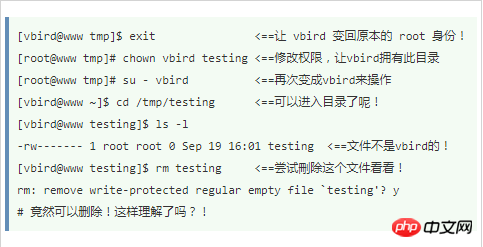
The difference between ls -l and ls -al: the first will not display hidden files, and the second will display hidden files (files starting with a dot (.)). This article will share with you the meaning of permissions on Linux directories and files. I hope it can help you.
1. The importance of permissions to files (r, w, x are mainly for the content of the file)
r: Readable file content
w: Yes Edit, add, and modify the contents of the file (but not delete files)
x: The file has permissions that can be executed by the system
2. The importance of permissions to directories
r: Has the permission to read the directory list, can query the file name list in this directory, and cannot switch to the directory
w: Has very important permissions, allowing users to enter the directory Delete, update, and create new files or directories
x: Users can enter the directory and call the information in the directory. That is, you can execute the cd command. It means searching and accessing the directory
Note: When you want to develop a directory for anyone to browse, you should give at least r and x permissions. W cannot be given casually; x being in the directory is related to whether you can enter the directory.


 \
\
Related recommendations:
The above is the detailed content of Detailed explanation of the meaning of permissions on Linux directories and files. For more information, please follow other related articles on the PHP Chinese website!




